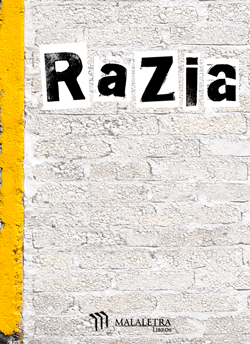Abraham Cruzvillegas | Nuria Montiel | Ramiro Chaves
Precio: $109 MXN
Razia es el resultado de la colaboración entre Abraham Cruzvillegas, Nuria Montiel y Ramiro Chaves.
La idea central del libro proviene de tomar la letra de una de las canciones del disco Autoconstrucción, que escribió Cruzvillegas y grabó con diferentes músicos de Glasgow a lo largo de una residencia en Escocia durante el 2008. Todas las canciones aluden al lugar donde creció, la colonia Ajusco al sur de la ciudad de México, a su entorno y a sus diferentes problemas sociales y políticos. Razia, título de la canción que eligieron, habla de un desalojo violento y de la comunidad que se une para ayudar a una familia que se encuentra en problemas.
Cada letra de cada una de las palabras que componen la canción, fue impresa en la Imprenta Móvil, proyecto de Nuria Montiel, en el que retoma la naturaleza contestataria de la gráfica y la palabra impresa sobre papel como medio de expresión. Así pues, cada letra impresa de Razia fue fotocopiada para formar -línea por línea- la canción completa. Luego las fotocopias fueron colocadas temporalmente en las fachadas de algunas de las casas de la colonia Ajusco, operando en la vía pública como una especie de memoria y huella de las muchas historias que se pueden contar allá. Ramiro Chaves registró con su cámara digital la acción, mostrando así el resultado del trabajo en conjunto de los tres artistas.
//
Razia is the result of the collaboration between Abraham Cruzvillegas, Nuria Montiel and Ramiro Chaves.
The central idea of the book comes from taking the lyrics from the songs on the Autoconstrucción record that allude to the place where Cruzvillegas grew up, the Ajusco neighborhood in the south of Mexico City, its surroundings and various social and political problems. Razia, the title of the song they selected, speaks of an eviction and of the community pulling together to help a family in trouble.
Every letter of every word in the song was printed on the Imprenta Móvil (Mobile Press), Nuria Montiel’s project that recaptures the protest nature of graphics and the printed word on paper as a means of aesthetic, political and social expression, of reproducing and spreading ideas, requests, slogans, petitions and demands in popular demonstrations and uprisings. Thereby, the printed lyrics of Razia were photocopied to form—line by line—the complete song. Then the photocopies were temporarily placed on the façades of some of the houses of the Ajusco neighborhood, serving as a public reminder and testimony of the many stories that can be told there. Ramiro Chaves recorded the result of the action with his digital camera. An important part of his work is related to the representation and construction of language, words and their letters, be they textual or suggested. His photographs come close to a representation of Neoconcrete poetry.
